Myanmar
Working Together to Save Myanmar’s Forests
In 2010, Myanmar had the third-highest annual rate of deforestation after Brazil and Indonesia, according to a report by the United Nations Food and Agriculture Organization (FAO). Between 1990 and 2015, the country lost nearly 15 million hectares of forests.
Confronted by this environmental challenge, the Government of Myanmar is committed to Reducing Emissions through Deforestation and Forest Degradation (REDD+). It became a UN-REDD partner country in 2011, and launched its National REDD+ Programme in 2016.
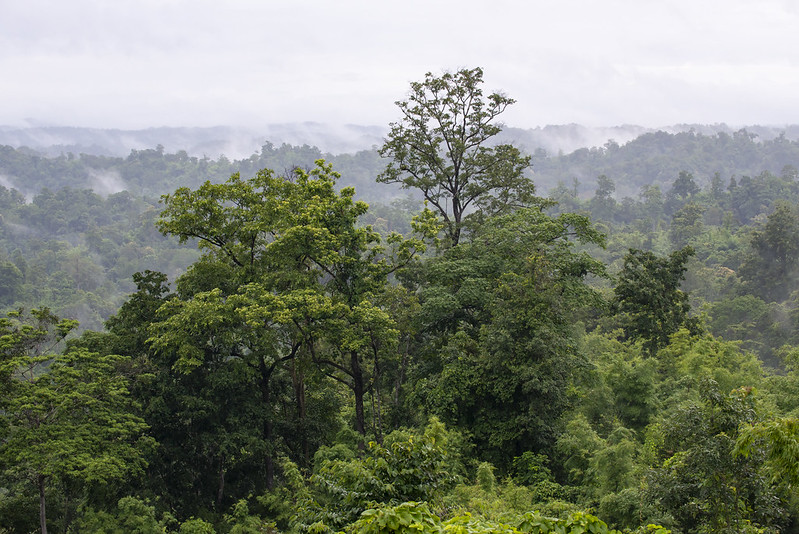
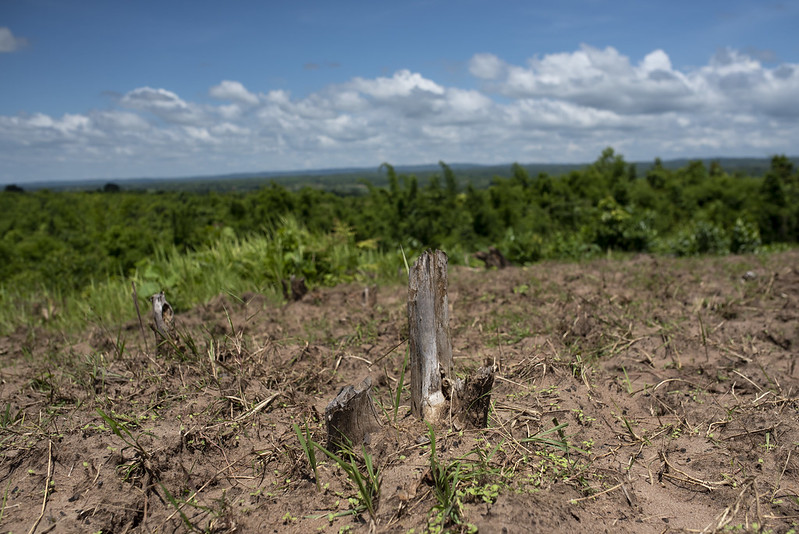
“REDD+ is very important for us because Myanmar is very sensitive to climate change,” says H.E. U Ohn Win, Myanmar’s Minister of Natural Resources and Environmental Conservation. “We need to protect our forests in order to protect our future.”
“Forests are central to Myanmar’s contribution to the global effort to address climate change under the 2015 Paris Agreement because currently deforestation and forest degradation account for about 80 percent of Myanmar’s greenhouse gas emissions,” says Dawn Del Rio, Deputy Resident Representative of UNDP – one of the three UN agencies facilitating the UN flagship programme on climate change known as UN-REDD (alongside FAO and UNEP).
Validating the National REDD+ Strategy
In 2019, Myanmar marked a milestone in its REDD+ journey in regards to its National REDD+ Strategy (NRS). The latest draft version was presented for validation to 200 stakeholders at a two-day “National Validation Workshop” held this past September.
The workshop was the culmination of a long and arduous process lasting more than two years, during which 50 consultations were conducted across the country, spanning diverse sectors including state and regional government departments, line ministries, expert review committees, ethnic groups, Ethnic Armed Organizations (EAOs), civil society and indigenous peoples organizations. In addition, a public consultation period was available online from April–May 2018, allowing anyone in Myanmar the opportunity to raise his or her concerns.
In his opening remarks at the workshop, Dr. Ye Myint Swe, Deputy Minister at the Ministry of Natural Resource and Environmental Conservation in Myanmar, acknowledged the history of distrust related to forest management. “If we are to collectively conserve and sustainably manage our forests, then we must overcome this history and establish an era of trust,” he said.
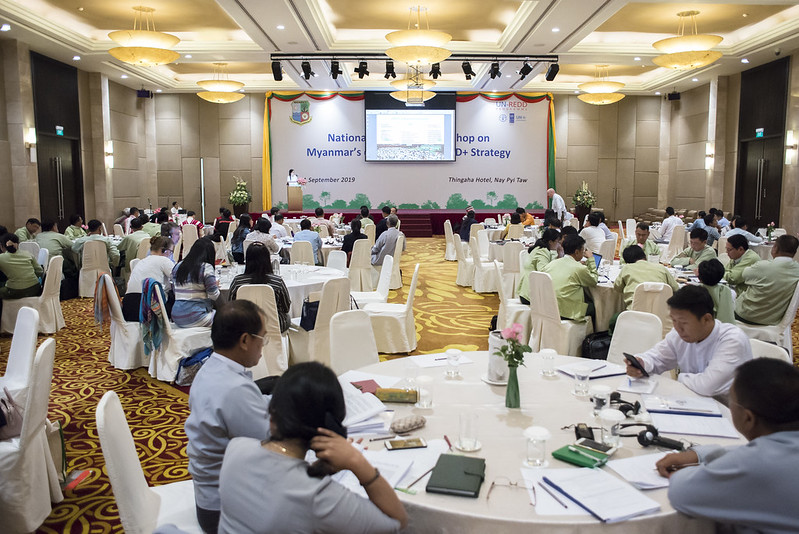
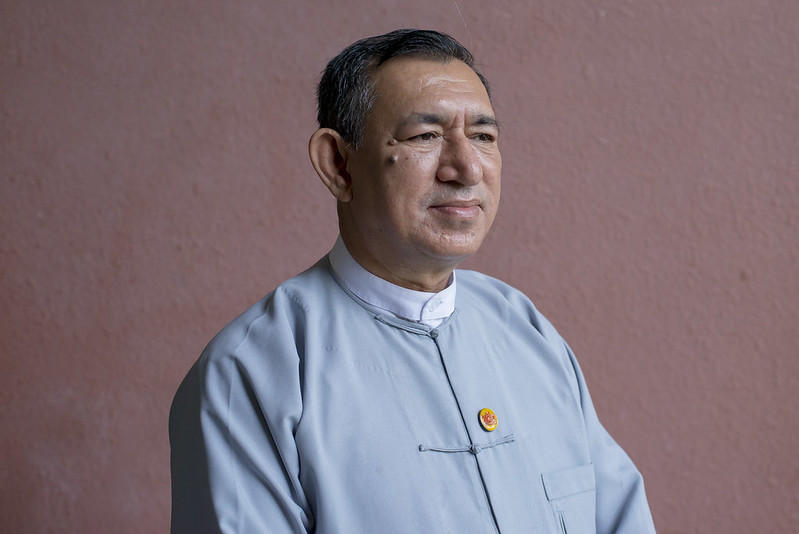
“I hope it is clear that the intensive consultation process associated with the Strategy is an indicator that the Union [national] Government wants to build trust among stakeholders.” “Today is a great opportunity to review and comment on the draft NRS,” he continued. “The NRS is not just a government strategy, but it is something that all stakeholders can take ownership of. During this workshop, we will need to identify which parts need to be amended. Then, the reviewed NRS will be submitted to the Government and approved before being implemented. It is an exciting time as we move towards a new era of forest management in Myanmar.”
Dr. Ye Myint Swe
Deputy Minister at the Ministry of Natural Resources and Environmental Conservation, Myanmar
A unique opportunity
The workshop, held in the capital of Nay Pyi Taw, provided a unique opportunity for different stakeholders to sit down together, grouped by their respective sectors – central government, sub-national governments, international organizations, EAOs, civil society groups – in order to give recommendations, comments and feedback on the NRS. In addition, participants were grouped by their geographic regions: Southeast (Tanintharyi, Mon, Kayin, Kayah), West Coast (Yangon, Ayeyarwady, Rakhine), Dry Zone (Mandalay, Magwe, Bago, Nay Pyi Taw), Shan and North (Kachin, Sagaing, Chin) to discuss specific regional priorities and challenges.
“REDD+ is about changing policies to protect and sustainably manage the forest,” says Timothy Boyle, Chief Technical Advisor of the UN-REDD Programme in Myanmar. “The decision has been made that REDD+ will be implemented at national scale, meaning policy change throughout Myanmar.”
Timothy Boyle
Chief Technical Advisor of the UN-REDD Programme in Myanmar
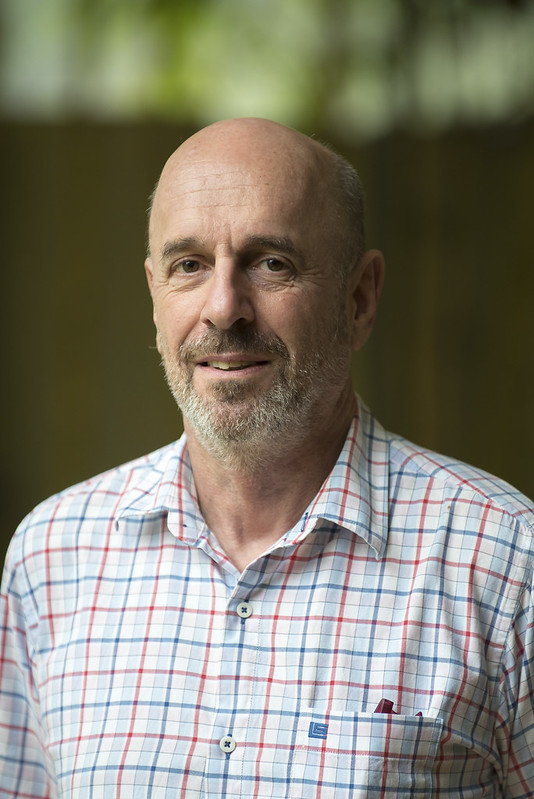
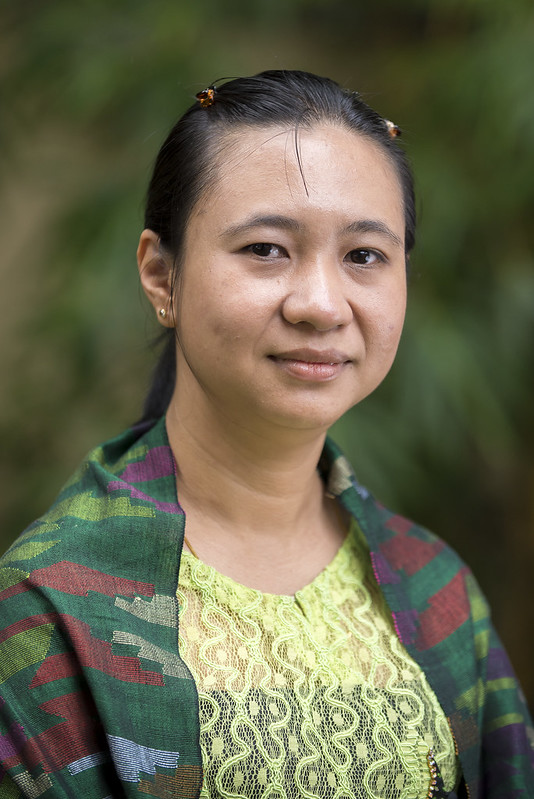
“POINT ensures the rights of indigenous peoples are protected during the REDD+ process. We serve as the bridge between communities and the Government,” says Naw Ei Ei Min, Director of POINT. “This is the first time that such a process has happened in Myanmar. The Forestry Department is the first government agency to discuss indigenous peoples’ rights. By engaging in REDD+, we are engaging in our country’s peace process.”
Naw Ei Ei Min
Director of POINT (Promotion of Indigenous and Nature Together)
Safeguarding Indigenous Peoples’ Rights
Myanmar’s National REDD+ Programme has created an invaluable forum for the Government to engage in dialogue with those that they would not ordinarily interact with, such as the Indigenous Peoples Organization POINT (Promotion of Indigenous and Nature Together).
“The VFV law is an issue of great concern to many stakeholders,” says San Sai Win from the Restoration Council of Shan State. “It says that land under customary management is not covered by the law. We need to have a better definition of customary management.”
Among the concerns voiced by POINT include the Vacant, Fellow and Virgin (VFV) Lands Management Law, which requires anyone living on land categorized as “vacant, fallow, and virgin” to apply for a permit to continue using it for the next 30 years. This affects about 30 percent of Myanmar’s land area, three-quarters of which are home to the country’s ethnic minorities. Land rights activists fear it unfairly criminalizes farmers who do not have permits and paves the way for unwarranted land seizures. In 2018, Myanmar’s parliament passed an amendment that imposed a two-year prison sentence on anyone found living on VFV lands without a permit after the date of March 11, 2019. This meant that millions of farmers, many of them illiterate, only had six months to complete the long process to legally claim their land.
Another controversial topic is “shifting cultivation”. Currently, 70 percent of Myanmar’s population lives in rural areas, relying on forests resources and subsistence agriculture for their livelihoods. “Shifting cultivation” is a practice in which ground is cleared of vegetation and cultivated for a few years and then abandoned for a new area until its fertility has been naturally restored. The practice allows for farming in areas with dense vegetation, low soil nutrients content and uncontrollable pests. However, in the process, trees in the forest are cut.
“We are trying to find a way to legalize shifting cultivation,” says Mai Yaw Han, Representative of Indigenous Peoples in the Bago region. “Sustainable shifting cultivation should be supported and we should find alternatives for people who want to move away from it instead of forcing them to stop it.”
Ethnic Armed Organizations
Further complicating the REDD+ process in Myanmar is the country’s ongoing internal conflict. More than 20 Ethnic Armed Organizations (EAOs) have been fighting the Tatmadaw (Myanmar military) – some of them for over 70 years – demanding self-determination. These EAOs are important stakeholders in the REDD+ process, as significant areas of forest are under their control.
“It is an extremely complex political situation,” says Boyle. “The Union Government controls only a portion of the forests, while EAOs control a large portion. The REDD+ consultation process has been entirely run by the UN-REDD Programme; it’s been difficult to make people understand we do this on behalf of the Forestry Department.”
Despite the challenges, progress has been made. REDD+ has been integrating the principle of Free, Prior and Informed Consent (FPIC). FPIC is a right enjoyed by indigenous people and local communities to give or withhold consent to a project that may affect them or their territories and enables them to negotiate the conditions under which the project will be designed, implemented, monitored and evaluated.
“The forestry sector is the first sector where we started practicing FPIC,” “FPIC has never been done on a nation-wide scale in Myanmar before. UNDP is currently piloting an approach to FPIC in Mon State,” adds Boyle. “We are taking the concerns of indigenous and non-indigenous local communities seriously.”
Dr. Thaung Naing Oo
The National Programme Director of UN-REDD in Myanmar and Director of the Forest Research Institute.
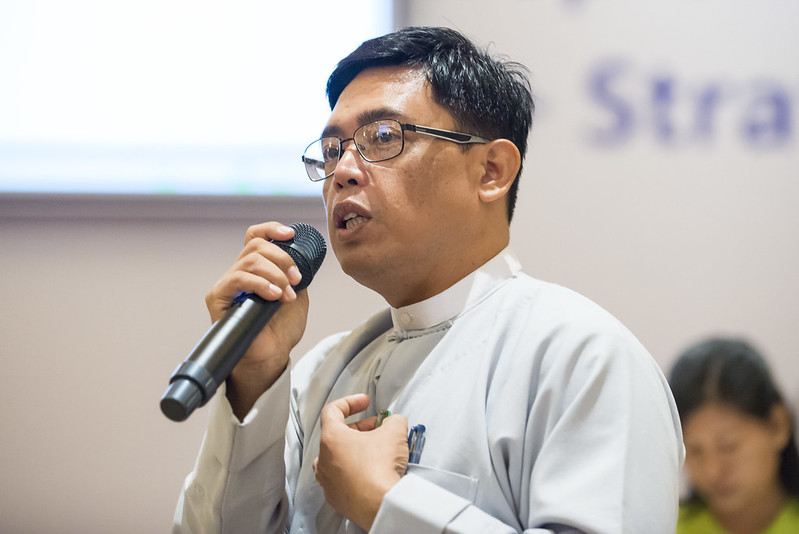
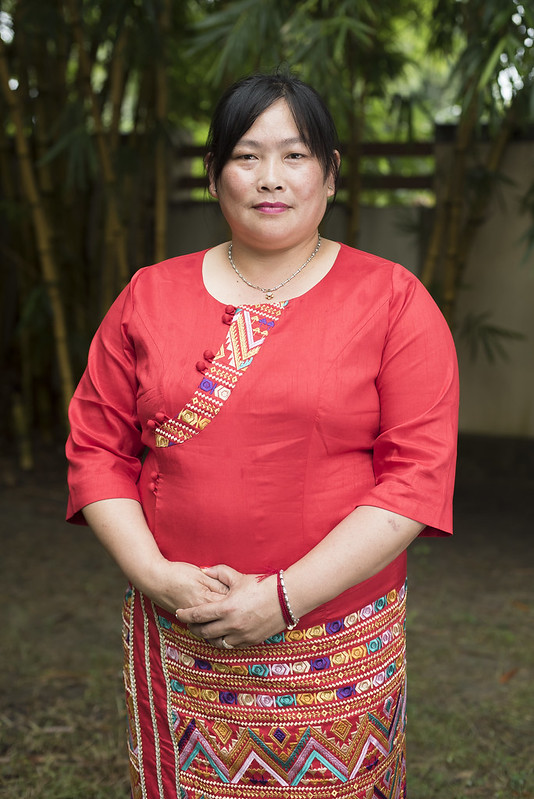
“A few months ago, the UN-REDD team approached the Restoration Council of the Shan State and since then, I have been involved in REDD+,” “Before this, I was not aware of the NRS, or even about REDD+.”
Major. Nang Moe Moe Saw
Public Relations Officer of the Restoration Council of the Shan State/ Shan State Army in Kyaukme
The implementation of the National Ceasefire Agreement (NCA) includes two committees – one tasked with monitoring and the other with fostering political dialogue across five different sectors. Sonny Mahinder, General Secretary of the All Burma Students’ Democratic Front from Loikaw, Kayah State, is responsible for overseeing the land and environment sector.
“Before 2013, I was in the jungle fighting against the military,” he says. “Since then, I’ve become involved in the ongoing peace process. Our country is facing problems with deforestation. Everybody needs to work on fighting climate change- not only as a country, but also as individuals. REDD+ allows us to work together.”
Sonny Mahinder
General Secretary of the All Burma Students’ Democratic Front
Currently, EAOS invited to REDD+ consultations are required (by Myanmar law) to be signatories of the NCA. Mahinder believes that there should be more leeway: “I want the non-signatory EAOs to also be involved. I know that the UN is prohibited from engaging with non-NCA groups, but our Government should consider being more flexible. Their involvement is also important.
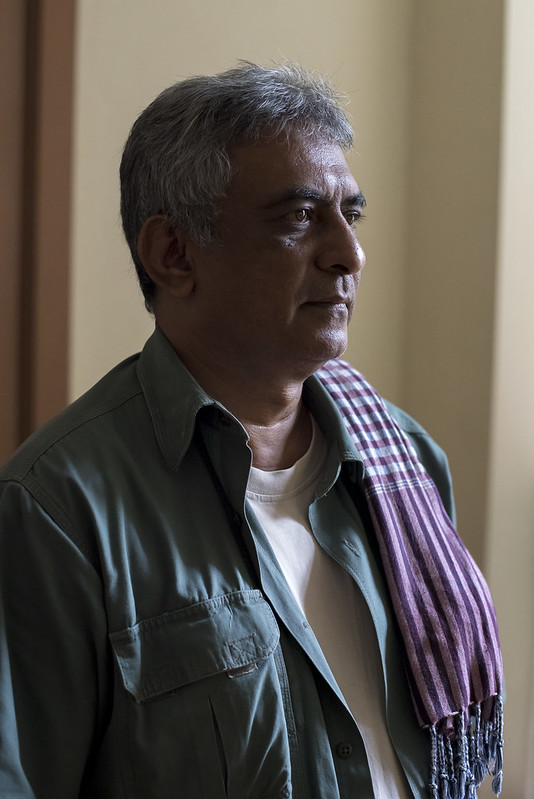
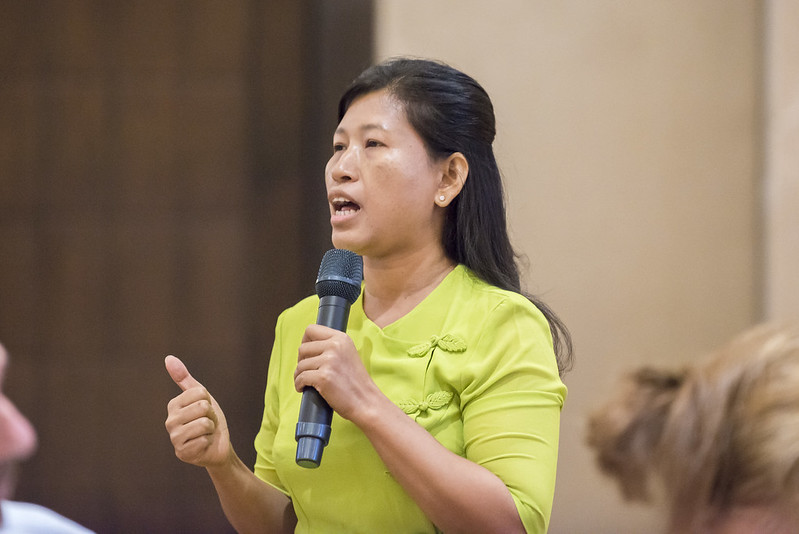
“Once the NRS has been finalized, implementation of all activities will be covered by investment funds,” “The Government of Myanmar will provide core funding, from existing and new budget allocations and public programmes. Funding from bilateral and multilateral donors, development banks and other international organizations will also be mobilized.”
Daw Khin Hnin Myint
Myanmar’s National REDD+ Programme Coordinator
Looking Ahead
If REDD+ is to be successfully implemented in Myanmar, it is essential that all stakeholders’ voices be heard. Implementing the 44 proposed “policies and measures” (PAMs) in the latest draft NRS to address the drivers of deforestation and degradation requires cooperation among all stakeholders, as each group needs to feel that it fully understands and endorses each PAM.
Given this, Dr. Thaung Naing Oo highlights that the NRS is a “living document” that can be modified at any time in accordance with the existing practices. Since the close of the National Validation Workshop, participants were given additional time to edit, drop or propose new PAMs before the final draft was submitted for government approval through the National REDD+ Taskforce and National Environmental Conservation and Climate Change Central Committee. The Minister of Natural Resources and Environmental Conservation (MONREC) now needs to submit it to the Cabinet for official approval and endorsement.
The vastness of the scope and degree of difficulty in drafting Myanmar’s NRS with so many diverse – and at times competing – voices amid the country’s on-going internal conflict should not be minimized. “I want to thank all the stakeholders who have actively participated in the development of the REDD+ Strategy,” says U Kyaw Kyaw Lwin, Deputy Director General of Myanmar’s Forest Department. “Without their involvement, suggestions and recommendations, this Strategy would not be complete or able to be implemented.”
Myanmar’s REDD+ Progress
The Warsaw Framework, an outcome of the COP 19 in 2013, states that in order for a developing country to qualify for Results-Based Payments, four requirements must be met:
- A Forest Reference Level (measure of baseline greenhouse gas emissions)
- A National Forest Monitoring System
- A Safeguard Information System
- A National REDD+ Strategy (and/or Action Plan)
Myanmar is well on its way towards achieving these goals. A nationally endorsed Forest Reference Level was submitted to UNFCCC for technical assessment in 2018.
Meanwhile, a National Forestry Inventory (NFI) design and sampling approaches have been developed in line with the existing forest inventory grid system at the Forest Management Unit level and harmonized with land attributes for activity data and emission-factor reporting.
The “Cancun safeguards”- a set of seven social and environmental safeguards- are intended to enhance the positive impacts of REDD+ and to prevent or mitigate any potential adverse impacts. Myanmar’s national approach to REDD+ safeguards has been drafted, the Safeguard Information System (SIS) has been designed, the SIS operationalization plan is being developed and the draft of the first Summary of Information (SoI) on safeguards for REDD+ is being finalized.
Since late 2016, Myanmar has been preparing its National REDD+ Strategy (NRS) with the technical support of the UN-REDD Programme. The process included over 50 consultations with diverse stakeholders to come up with an analysis of the drivers of deforestation and forest degradation, and a list of proposed national and sub-national “policies and measures” (PAMs) intended to address the fundamental factors underlying these drivers.
The NRS is important because Myanmar is currently revising its Nationally Determined Contribution (NDC), with the intention to submit to the United Nations Framework Convention on Climate Change (UNFCCC) by March 2020. The land use, land-use change, and forestry (LULUCF) component of the NDC will be fully-aligned with Myanmar’s NRS.
Story by: Leona Liu, Asia-Pacific Regional Communications & Knowledge Management Specialist for the UN-REDD Programme
Additional reporting by: Alexis Corblin, UNEP Asia-Pacific Regional Technical Advisor
Photos and photo slideshow by: Cory Wright/UN-REDD Programme


